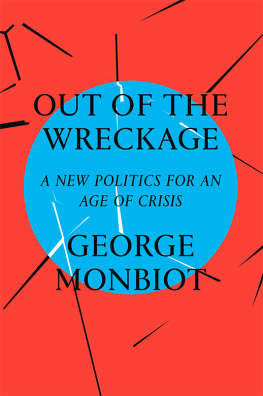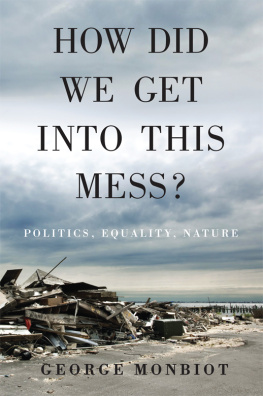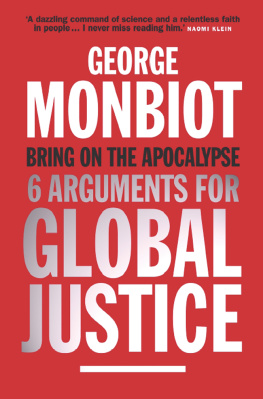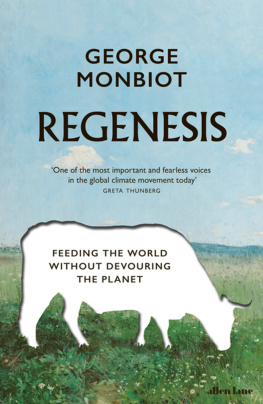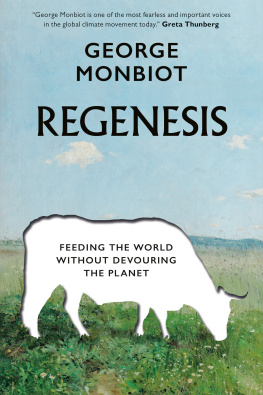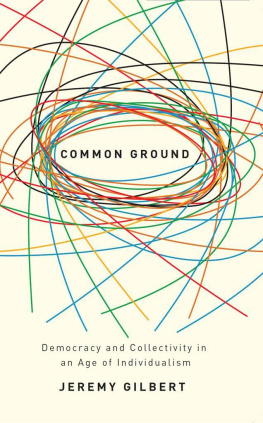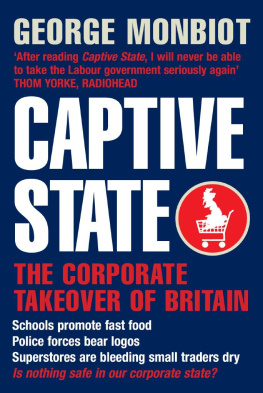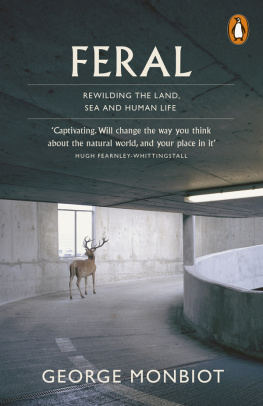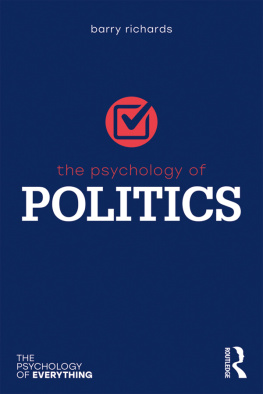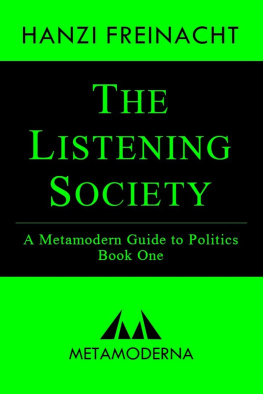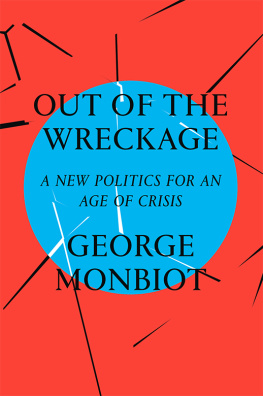
Out of the Wreckage
Out of the
Wreckage
A New Politics for an Age of Crisis
George Monbiot

First published by Verso 2017
George Monbiot 2017
Figures from Kate Raworths Doughnut Economics and Paul
Samuelsons Economics are reproduced with permission, for
which the author and publisher express their gratitude.
All rights reserved
The moral rights of the author have been asserted
1 3 5 7 9 10 8 6 4 2
Verso
UK: 6 Meard Street, London W1F 0EG
US: 20 Jay Street, Suite 1010, Brooklyn, NY 11201
versobooks.com
Verso is the imprint of New Left Books
ISBN-13: 978-1-78663-288-3
ISBN-13: 978-1-78663-745-1 (EXPORT)
ISBN-13: 978-1-78663-291-3 (US EBK)
ISBN-13: 978-1-78663-290-6 (UK EBK)
British Library Cataloguing in Publication Data
A catalogue record for this book is available from the British Library
Library of Congress Cataloging-in-Publication Data
A catalog record for this book is available from the Library of Congress
Typeset in Fournier MT by Hewer Text Ltd, Edinburgh
Printed and bound by CPI Group (UK) Ltd, Croydon, CR0 4YY
To Rebecca, Hanna and Martha
With my love, and in hope of a better world.
Nations and peoples are largely the stories they feed themselves. If they tell themselves stories that are lies, they will suffer the future consequences of those lies. If they tell themselves stories that face their own truths, they will free their histories for future flowerings.
Ben Okri, A Way of Being Free
Contents
You cannot take away someones story without giving them a new one. It is not enough to challenge an old narrative, however outdated and discredited it may be. Change happens only when you replace it with another. When we develop the right story, and learn how to tell it, it will infect the minds of people across the political spectrum. Those who tell the stories run the world.
The old world, which once looked stable, even immutable, is collapsing. A new era has begun, loaded with hazard if we fail to respond, charged with promise if we seize the moment. Whether the systems that emerge from this rupture are better or worse than the current dispensation depends on our ability to tell a new story, a story that learns from the past, places us in the present and guides the future.
The Power of the Story
Stories are the means by which we navigate the world. They allow us to interpret its complex and contradictory signals. When we encounter a complex issue and try to understand it, what we look for is not consistent and reliable facts but a consistent and comprehensible story. When we ask ourselves whether something makes sense, the sense we seek is not rationality, as scientists and philosophers perceive it, but narrative fidelity. Does what we are hearing reflect the way we expect humans and the world to behave? Does it hang together? Does it progress as stories should progress?
Drawing on experimental work, Marshall shows that, even when people have been told something is fictitious, they will cling to it if it makes a good story and they have heard it often enough. Attempts to refute such stories tend only to reinforce them, as the disproof constitutes another iteration of the narrative. When we argue, Its not true that a shadowy clique of American politicians orchestrated the attack on the World Trade Centre, those who believe the false account hear that a shadowy clique of American politicians orchestrated the attack on the World Trade Centre. The phrase Its not true that carries less weight than the familiar narrative to which it is attached.
A string of facts, however well attested, has no power to correct or dislodge a powerful story. The only response it is likely to provoke is indignation: people often angrily deny facts that clash with the narrative truth established in their minds.
The only thing that can displace a story is a story.
Effective stories tend to possess a number of common elements. They are easy to understand. They can be briefly summarised and quickly memorised. They are internally consistent. They concern particular characters or groups. There is a direct connection between cause and effect. They describe progress from a beginning through a middle to an end. The end resolves the situation encountered at the beginning, with a conclusion that is positive and inspiring.
Certain stories are repeated across history and through different cultures. For example, the story of the hero setting out on a quest, encountering great hazard (often in the form of a monster), conquering it in the face of overwhelming odds, and gaining prestige, power or insight is common to cultures all over the world, some of which had no possible contact with each other. Ulysses, Beowulf, Sinbad, Sigurd, C Chulainn, Arjuna, St George, Lc Long Qun and Glooskap are all variants of this universal hero. Our minds appear to be attuned not only to stories in general, but to particular stories that follow consistent patterns.
In politics, there is a recurring story that captures our attention. It goes like this:
Disorder afflicts the land, caused by powerful and nefarious forces working against the interests of humanity. The hero who might be one person or a group of people revolts against this disorder, fights the nefarious forces, overcomes them despite great odds and restores order.
Stories that follow this pattern can be so powerful that they sweep all before them: even our fundamental values. For example, two of the worlds best-loved and most abiding narratives The Lord of the Rings and the Narnia series invoke values that were familiar in the Middle Ages but are generally considered repulsive today. Disorder in these stories is characterised by the usurpation of rightful kings or their rightful heirs; justice and order rely on their restoration. We find ourselves cheering the resumption of autocracy, the destruction of industry and even, in the case of Narnia, the triumph of divine right over secular power.
If these stories reflected the values most people profess democracy, independence, industrial progress the rebels would be the heroes and the hereditary rulers the villains. We overlook the conflict with our own priorities because the stories resonate so powerfully with the narrative structure for which our minds are prepared. Facts, evidence, values, beliefs: stories conquer all.
Heroes and Villains
The two most successful political stories of the twentieth century both of which have survived into the twenty-first are diametrically opposed to each other, but follow the same narrative pattern.
The social-democratic story explains that the world fell into disorder characterised by the Great Depression because of the self-seeking behaviour of an unrestrained elite. The elites capture of both the worlds wealth and the political system resulted in the impoverishment and insecurity of working people. By uniting to defend their common interests, the worlds people could throw down the power of this elite, strip it of its ill-gotten gains and pool the resulting wealth for the good of all. Order and security would be restored in the form of a protective, paternalistic state, investing in public projects for the public good, generating the wealth that would guarantee a prosperous future for everyone. The ordinary people of the land the heroes of the story would triumph over those who had oppressed them.

